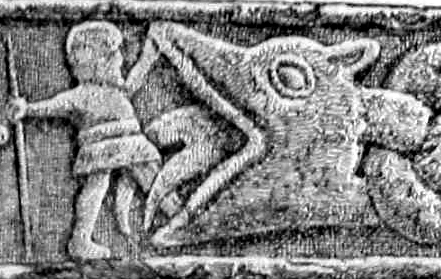Eiríksmál is a skaldic poem composed c. 954 at the behest of the Norwegian queen Gunnhild in honour of her slain consort Erik Bloodaxe. Only the beginning of the poem is extant.
According to Roger of Wendover, Eric, a Viking ruler was betrayed and killed on Stainmore in 954 AD, while on the run and after being expelled from York. Eric had previously been King of Northumbria (c. 947–948 and 952–954) during his more successful days.

Structure
Although classified as a Skaldic poem since it deals with a historical figure, it is actually anonymous and in the simple fornyrðislag meter, rather than ornate dróttkvætt. It thus has much in common with the poems of the Poetic Edda. The later poem Hákonarmál appears to be modelled on Eiríksmál.
The poem is cast as a dialogue between Eric, the gods Odin and Bragi, and the legendary hero Sigmund.
Translation from Old Norse
Based on Finnur Jónsson’s Norse edition, English translation by Misplaced Pages editors.
Verse 1, Odin
|
"Hvat's þat drauma? hugðumk fyr dag rísa |
"What kind of dream is this? I thought myself rise before day-break |
Verse 2, Odin
|
Erum ór heimi hölða vánir |
Out of the world are by me warriors expected, |
Verse 3, Bragi
|
"Hvat þrymr þar, sem þúsund bifisk |
"What thunders there, as if a thousand were marching, |
Verse 4, Odin
|
"Heimsku mæla skalat hinn horski Bragi, |
"The wise Bragi should not speak foolishly, |
Verse 5, Odin
|
"Sigmundr ok Sinfjötli, rísið snarliga |
"Sigmund and Sinfjotli, rise quickly |
Verse 6, Bragi, Odin
|
"Hví 's þér Eireks ván heldr an annarra?" |
"Why do you expect Erik, rather than others?" |
Verse 7, Bragi, Odin

|
"Hví namt hann sigri þá, es þér þótti snjallr vesa?" |
"Why did you then deprive him of victory, when you thought him so brave?" |
Verse 8, Sigmund
|
"Heill þú nú Eirekr, vel skalt hér kominn |
"Hail you now, Erik, you will here be greeted well |
Verse 9, Erik
|
"Konungr 'ru fimm, kennik þér nafn allra, |
There are five kings, I shall teach you the names of them all; |
Notes
- As described in several sources, Odin's son Balder was accidentally killed by his blind brother Höðr, who was tricked by Loki. The gods later failed in bringing him back from Hel, and so his return would have been cause for great celebration.
- Odin was eager and anxious for Erik to arrive in Valhalla because he needed his military skills to help defend Valhalla from the forces of chaos.
Citations
- Fulk 2012, p. 1003.
- Williams 2017, p. 298.
- *"Hákonarmál : Old Norse". www.heimskringla.no. Retrieved 1 March 2022.
- Williams 2017, p. 300.
- Page 2002, pp. 109–111.
Sources
Online
- "Norse Mythology". norse-mythology.org. Retrieved 1 March 2022.
- Finnur Jónsson's edition of Eiríksmál as part of Carmina Scaldica, Udvalg af norske og islandske skjaldekvad ved Finnur Jónsson, G.E.C. Gads Forlag - København 1929, online at heimskringla.no
Books
- Fulk, R. D. (2012). "Anonymous, Eiríksmál". In Whaley, Diana (ed.). Poetry from the Kings’ Sagas 1: From Mythical Times to c. 1035. Skaldic Poetry of the Scandinavian Middle Ages 1. Turnhout: Brepols. ISBN 978-2-503-51896-1.
- Page, R. I. (2002). Chronicles of the Vikings - Records, Memorials and Myths. British Museum Press. ISBN 0-7141-2800-7.
- Williams, Thomas (2017). Viking Britain - A History. William Collins Books. ISBN 978-0-00-817195-7.